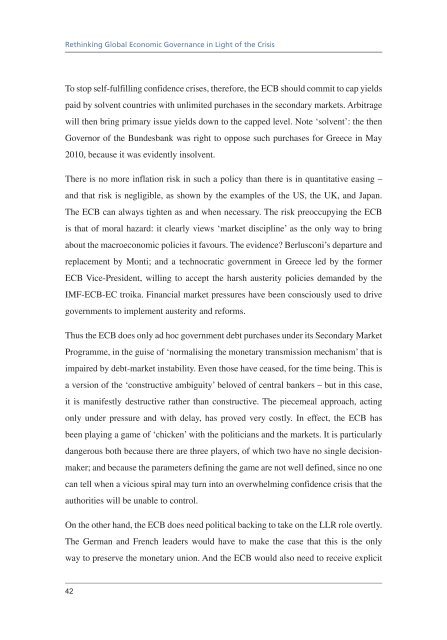Download PDF - Vox
Download PDF - Vox
Download PDF - Vox
- No tags were found...
You also want an ePaper? Increase the reach of your titles
YUMPU automatically turns print PDFs into web optimized ePapers that Google loves.
Rethinking Global Economic Governance in Light of the CrisisTo stop self-fulfilling confidence crises, therefore, the ECB should commit to cap yieldspaid by solvent countries with unlimited purchases in the secondary markets. Arbitragewill then bring primary issue yields down to the capped level. Note ‘solvent’: the thenGovernor of the Bundesbank was right to oppose such purchases for Greece in May2010, because it was evidently insolvent.There is no more inflation risk in such a policy than there is in quantitative easing –and that risk is negligible, as shown by the examples of the US, the UK, and Japan.The ECB can always tighten as and when necessary. The risk preoccupying the ECBis that of moral hazard: it clearly views ‘market discipline’ as the only way to bringabout the macroeconomic policies it favours. The evidence? Berlusconi’s departure andreplacement by Monti; and a technocratic government in Greece led by the formerECB Vice-President, willing to accept the harsh austerity policies demanded by theIMF-ECB-EC troika. Financial market pressures have been consciously used to drivegovernments to implement austerity and reforms.Thus the ECB does only ad hoc government debt purchases under its Secondary MarketProgramme, in the guise of ‘normalising the monetary transmission mechanism’ that isimpaired by debt-market instability. Even those have ceased, for the time being. This isa version of the ‘constructive ambiguity’ beloved of central bankers – but in this case,it is manifestly destructive rather than constructive. The piecemeal approach, actingonly under pressure and with delay, has proved very costly. In effect, the ECB hasbeen playing a game of ‘chicken’ with the politicians and the markets. It is particularlydangerous both because there are three players, of which two have no single decisionmaker;and because the parameters defining the game are not well defined, since no onecan tell when a vicious spiral may turn into an overwhelming confidence crisis that theauthorities will be unable to control.On the other hand, the ECB does need political backing to take on the LLR role overtly.The German and French leaders would have to make the case that this is the onlyway to preserve the monetary union. And the ECB would also need to receive explicit42














